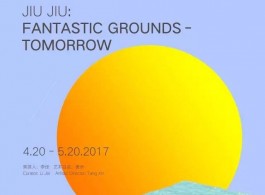Light Pavilion Project
Fantastic Grounds – Tomorrow
2017.4.20 – 2017.5.20
Artist: JIU JIU
Curator: Li Jia
Artistic Director: Tang Xin
Taikang Space (Red No.1-B2, Caochangdi, Cuigezhuang, Chaoyang District, Beijing, CHINA)
Exhibition Introduction
“Fantastic Grounds: Tomorrow”, the second exhibition of the Light Pavilion Project in 2017, is dedicated to a set of Jiu Jiu’s most recent video pieces. In a broad sense, “Fantastic Grounds” responds to multiple concepts ranging from the physical / social space constructed or transformed by human labor or relationship, to the metaphoric extension of a new world opened up in our mind, and of course, it can be interpreted as the very production of modern cities—the most significant and complex manmade space—as the result of a hybrid among technology, urban planning, imagination and the whole of our specific, quotidian experience. The production of modern city in a sense has mixed the virtual with the real, imagination with experience, knowledge with belief in the current context characterized with digital technology, the Internet and computer science. It witness the process of how this modernity, started and marked by the visualization of the world, has sinuately gains the absolute sovereign over the globe by virtue of digital technology, computer science and the Internet. Yet its dominant image, a technologized visuality is featured by a paradoxical duality of a deceptive transparency which never been actualized. This crystal-clear illusion turns the real desert of contemporary life into a sweet promise of unexhausted, universal time, therefore incurs the unsettled debts of modernity, debt that belongs to players of tomorrow.
Jiu Jiu’s work can be viewed as the attempt for the redemption of this debt, though in a dispassionate, rigid way. He used to describe his task here as an odd question, “Where did Descartes come from?“, believing the debts of modernity were built up at the cartesian moment marked not only by the birth of “ego cogito ergo sum”, but also the modern coordinate system which ferments the contemporary urban planning method such as parameter design and digital construction. It in turn defines our imagination, experience and paractice of space. The question of “Where” can no longer immediately recalls the memory of certain smell, a moment, or a site, nor the myths and stories passed on from generation to generation by the bonfire, nor a mountain routes that resurfaces in our mind and marked by dangers, clouds or preyers. It has been reduced to an abstract position that can only be made completely transparent, like those in power in the movie “The Hunger Games. They govern from the top in an abstract way, while abstract governance means inevitable destruction of the physical being.
It is the seemingly innocent transparency that Jiu Jiu is trying to penetrate. His works seem to be dominated by “artificial” images designed by parameters and built digitally, including the graphs of human-computer interface in the early 1960s, the visualized material for the purpose of military and space industry produced in Bell labs, the Disney World as a model for urban planning, adaption of interactive computer games like virtual cities, data processing and quantitative analysis of maps, procedure of parameter design and digital construction… We can call them a new kind of montage that takes computer-generated images and virtual landscape as its major resources, tools and targets. Digital graphs have replaced film shots in the traditional sense and become basic units of narrative syntax, but at the same time, they are also explored, traced to the origin, connected and activated by narratives. More importantly, graphs represent a subjective quality that cannot give carta blanche to their contents, representation or logic, but it goes beyond the approval of its inner life and aesthetic-political power from the perspective of art history or film studies. It is rather aimed to wake up the leviathan behind modern virtual experience and virtual real experience, or the Avatar that is hidden quietly inside every life implanted by a global city-state with technology as medium and intensifier. It is the debts imposed on everyone of us by modernity that proves our loss of innocence. It is a proof that can evoke — it is our stake for tomorrow.
Jiu Jiu is born in Lanzhou in 1986. He got a BA from the Department of Art Theory, Sichuan Fine Arts Institute in 2011. Currently lives and works in Beijing.
Light Pavilion Project
As a site for individual project, “Light Pavilion” is initiated in 2012, based on the second floor of Taikang Space. It aims at providing a flexible platform for artists to realize their ambitions. After an interval of two years, “Light Pavilion” is restarted in 2016, embracing a vision always open to uncertainty, complicity and detournement. It’s not only a site for sensational immersion and experiential evocation but also a forum dedicated to diversity and otherness. In 2017, Light Pavilion will bring the young curators and their practice into its focus, and open to a more divisive, expanded field of contemporary art scene.



